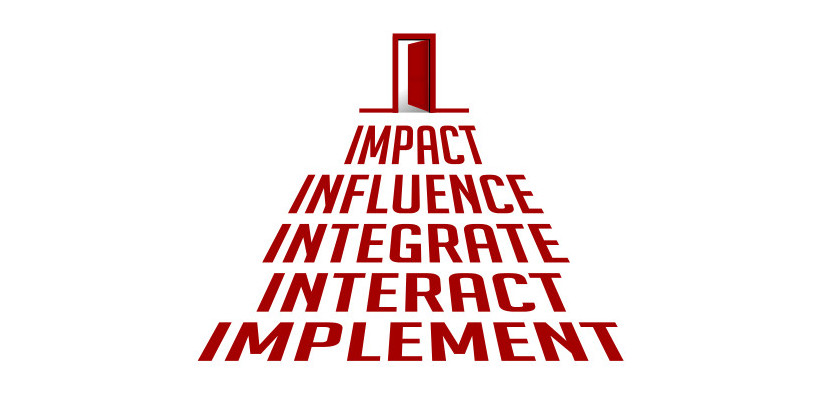
To celebrate the upcoming 5th Anniversary of Inner Strength Communication Inc., I challenged you to #AskMeAnything. This week, I answer a question from Susan Martin, Award Winning Communicator and Consultant from Jacksonville, Florida.

Susan's question: Do you have any experience or insight as female leader who consulted on a project in a male-dominated industry that might be helpful to professionals working / leading internal communications at such companies?
My Answer:
Wow. This is a big question so I want to do my best to answer based on my personal experience both as a corporate communicator and a consultant.
I've had the pleasure to work with some great leaders, colleagues, and organizations throughout my career. Many bosses have become not only mentors, but also friends, and for that, I am forever grateful.
As an immigrant to Canada in the 1970s, it was not unusual for me to realize that, when I followed my interests and passions, I was the only minority and sometimes girl/woman at the table - or in the band's saxophone section ; ). I spent a lot of time and effort justifying my 'artsy' interests to my East Indian parents while trying to be more like my peers - regrettably losing my language and some of my culture along the way.
The one thing I never doubted about myself was that when I set a goal, on behalf of myself or the club. band. team or organization I represented, I always accomplished it. I always managed to bring people together, find the right talent, encourage collaboration and inspire people to get things done successfully. Sometimes as a leader, but mostly behind the scenes. I always looked forward, never back.
I think that's how I approached my work life. From the beginning. I sat around tables with mostly white men, and some (in recent years) primarily white women. I tried to understand them; their needs, and their goals, and do my part to deliver solutions. For the majority of my corporate career, I worked for technology companies (many men in IT and Sales) \and then worked in grocery retail (although getting better, most leaders, store and distribution centre managers and operators were men) and when I sit with client teams, I more-often-than-not realize that I am one of a few women in the room and often the only minority.
So here is my advice, based on that experience:
Understand their needs - In my circle of senior communication experts, we always ask, "What are the business problems we are trying to solve with a communication solution?" The more I can showcase that I understand their business issues and can solve them with my skills and expertise, the more any leadership group responds. Many recent studies have highlighted business acumen as a key skill for communication professionals.
Bring your unique point of view - As a communication professional, as a woman, as a member of your generation, as a customer, etc...you have the opportunity to bring a unique point of view. Whether it's the expertise of employee needs and wants, technology solutions, or best practices, the leaders around a table need to understand why you're there. What can you add to the conversation or organization? I often tell internal communication pros that they need to develop their unique point of view and connect it to the business needs in order to be invited back to collaborate.
Know your superpower - Every organization benefits from Strategic Internal Communication. My superpower has always been in connecting the dots from business strategy to employee delivery. When I go into new organizations, I get teams and leaders to simply work together toward common solutions. I can also listen for common themes from employees and leaders alike and roll them into priorities. Ask yourself what your superpower is? Sometimes as a female, these are very different from the other skills around the table and you can help fill some gaps.
Use a methodology - For most of my career, I delivered my programs intuitively. In fact I've always prided myself on going with the flow and being flexible and changing directions when necessary to deliver a result. That being said, I've realized that it's important to have a methodology (or method to my madness). With all projects, we insist on starting with research before creating strategy and design. We then help launch new programs to ensure both adoption and maintenance. We measure success using a Strategic Communication Planning methodology. We train communication professionals to be more strategic using our Five-I Framework (see image). We've also created an Engagement Workshop that helps clarify goals and identify gaps in the organization.
 Each of these solutions and methodologies connect business needs to what we will deliver.
Each of these solutions and methodologies connect business needs to what we will deliver.
Leaders like to see the consistency of a methodology and understand what is going to happen next and most importantly, why it's relevant to them. Where possible, use or build your methodology.
Showcase results - Leaders are accountable for results. They live with dashboards, spreadsheets, and financial reports that tell the story of whether they are achieving their objectives or not. In today's world of real-time access to data and measurement, they get updates up to the minute. I find it really important, when working with executives, to keep them informed of progress and help them measure success. Here's the tricky part. You want to start by setting goals that are linked to business goals and present what you did to help influence business outcomes. They don't want to hear about all the stuff that was created. They want to know the influence and impact you had. Even when a result is not as it should be, I come to the table prepared to discuss what we can do better next time. Communicators need to learn to brag about their results.
Find Advocates - In every organization, there is a leader who intuitively understands the purpose and role of communication. Often the HR leader and Marketing leaders can help, but I've had great legal, financial and operational leaders with whom I've partnered. These relationships and leveraging their ability to influence have helped me 'influence the influencer.' What's been amazing in my consulting career is that it is often these influencers who have moved on to new organizations and called me for help when they need communication support.
Believe in yourself first - The most important thing I have learned on this entrepreneurship journey is that when you are no longer defined by a title, role or organization, you are left with defining yourself. Having confidence it integral when striking out on your own, building your business and managing your reputation. Most of the work I did with my personal coach early in my journey helped me create affirmations and work hard to reduce the negative self-talk. In order to get others to believe in you, you must first believe in yourself.
Celebrate and Acknowledge Diversity - I mentioned early in this post that I tried hard to be like my peers. I tried to learn how to play golf (that was a disaster). I'd go out drinking with the boys and know every rule of every sport that exists. Over the last few years, with conversations focused more on diversity and inclusion, I've realized that my diverse experiences, knowledge and skills need to be celebrated, not hidden, and that I no longer feel the need to put on a persona that doesn't reflect who I am. Be yourself and celebrate what makes you unique.
As I look at the ground-level of organizations that I serve across North America - I see diversity of gender, culture, sexual preference, generation,ability etc...,represented. I'm noticing some changes starting to happen in the upper echelons of organizations and especially start-up organizations. There is a more conscious (although slow) effort to create boards and executive teams that are more reflective of employee, customer and community diversity. There is an advantage to acknowledge your diversity and use it to create change. Some organizations today even have mandates to ensure that a percentage of suppliers they hire are women- or minority-owned businesses. This puts us at an advantage, where before we could have been overlooked regardless of our expertise.
I hope this advice is helpful Susan. The truth is that it will work regardless of whether you are working in a male-dominated field or not and regardless of industry. All the best with your consulting career and I hope that others reading this blog found the advice helpful.
Stay tuned for my next #AskMeAnything blog where I contemplate Eleanor Tan's and Sabita Singh's questions:
1. What inspired you to keep going when the going got tough?
2. How close and when were you closest to throwing in the towel and what stopped you in your tracks?
3. A lot of entrepreneurs rush back to the corporate world too soon so it would be great if you could share the importance of perseverance and setting up a financial plan.
Do you have a comment or question? Please share and #AskMeAnything.